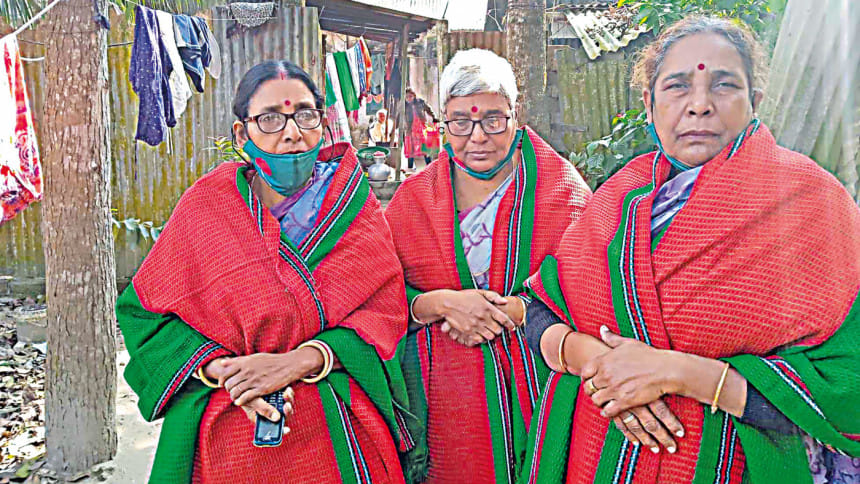The Courageous Journey of three sisters

Despite their remarkable contributions during the Liberation War, the sacrifices made by women are frequently relegated to the shadows in the records of our history. From taking up arms and leading freedom fighters to performing various roles, the invaluable efforts of these women, regrettably, have not garnered the acknowledgment they rightfully deserve, both during and after the war.
One poignant story unfolds with three sisters—war heroes determined to avenge their father's murder and win the battle against the Pakistani forces at any cost.
The journey through grief
As the war erupted, the Kar family found themselves in increasingly perilous circumstances. Confronted with frequent threats from locals adhering to a pro-Pakistani mindset, they were pressured to undergo a religious conversion to Islam. Recognizing the severity of the situation, Gita, Ira, Bhokti, along with their father and another sister, decided to seek refuge in the remote village of Erinda in Rajbari, their maternal grandparents' residence. Unfortunately, despite their efforts to evade the threats, their attempt proved futile.

Their father fell victim to the aggression of the Pakistani military's local collaborators on May 5, 1971, prompting the sisters along with their maternal family, to leave Rajbari, abandoning her mother and younger siblings, and embarking on a journey to India. They finally settled in Chakdaha.
Gita, Ira, and Bhokti vividly recall the hardships they endured during this tumultuous period. "The nine-day journey was filled with vivid memories of relentless walking, hunger, witnessing people perish, and villages being ablazed," recounted Ira.
Driven by the shock of her father's death, the sisters were resolute in freeing their homeland from the oppressive grasp of the Pakistanis. After learning about a training camp from a relative, they contemplated joining to camp to ward off the Pakistanis.
Preparing for the battlefield
Gita and Ira became part of the inaugural group at the Gobra camp, led by Syeda Sajeda Chowdhury, starting on July 2, 1971. Alongside five other girls, they embarked on this journey. The women in the training groups had lost their family members and were resolute to take revenge. Established in Kolkata in 1971, the Gobra Camp provided training to 400 women freedom fighters in different categories: civil defense, nursing, and guerrilla warfare.
"We were encouraged through lectures on historical accounts of war and insights into prominent revolutionaries from teachers hailing from different Indian universities," explained Ira.
"Our training encompassed guerrilla warfare and first aid, including theoretical sessions on firearm usage. However, the practical aspects of treating wounded freedom fighters were taught at a local hospital," shared Gita while reminiscing that the main driving force was the desire to win the battle against the Pak army at any cost.
Bhokti, who joined the camp a few days later, recalled, "We were instructed not to turn on lights after dawn since it was an abandoned three-story building." The food they used to get at the training camp was paltry, but that didn't bother the camp inmates.
After completing their training, it was time to apply their skills on the battleground. However, only 15 young women, including Gita and Ira, agreed to join the war. Bhokti, initially intending to join her sisters in the subsequent group, later decided to serve wounded freedom fighters at the local hospital, where she had received her nursing training.
Unfazed by threats and without fear, the 15 courageous women embarked on their journey from Howrah to Agartala in October after a three-month-long training.
A short stretch of uncertainty along the path
"Our journey to Agartala took an unexpected stop in Sylhet, leaving all of us baffled. The experience, in one word, was horrifying. The entire train was packed with the Indian Army, armed and en route to join the war. The 15 girls, along with the guide, were placed in one such compartment. Unfortunately, the guide, unable to communicate in Bangla, vanished without a trace one day," said Gita.
Undeterred, the resolute group pressed on without their guide. They endured nearly ten days without a specific address to go to or proper meals, sustaining themselves solely on oranges and water.
"Eventually, we successfully reached the refugee camp on the Sylhet border, though convincing the Indian Army of our genuine intentions proved challenging initially," said Ira.
As a result of not having enough food for 8 to 9 days, many of them lost consciousness. Two men named Makhon Shom and Milon Talukdar from the refugee camp played a crucial role in our journey, providing us with all possible assistance.
"Makhon da helped us to call Sajeda apa and provided food and kindled fires to keep us warm," said Ira.
Sajeda Chowdhury shared the address of Bangladesh Hospital in Bishramganj and communicated with Zafarullah Chowdhury and others associated with it. Thanks to Makhon Shom's generosity and prompt action from the people of Bangladesh Hospital, Gita, Ira, and their companions reached Agartala.
Caring for the wounded
Upon reaching their destination, the women discovered that they were not sent to the expected war zone. Instead, they were assigned to assist at Bangladesh Hospital, a 480-bed facility in Agartala. Despite the shift in plans, the group of young women committed wholeheartedly to their roles as medical attendants.
Recalling the memories of those days, Ira said, 'The hospital's location was around 12 miles away from the battleground. Sounds of bombing and firing were heard regardless of time. Every day, freedom fighters were brought to the hospital with serious injuries.'
'Many wounded freedom fighters lying on the bed, enduring endless pain, would pray that their sacrifices might not go to waste and would bring independence to the country,' continued Gita.
'We were living every moment with fear of losing and simultaneously hoping to fight till the end for Bangladesh,' said Gita. Never letting go of the spirit of fighting on the battleground, she was always ready to join the battleground when needed. Hearing the news of independence, Gita cried a lot, triggered by two emotions: happiness for victory and sorrow for not being able to fight in battle. The sisters remember how they and their friends consoled themselves; serving at the hospital was almost as good as fighting in the war.
Gita and Ira returned to Bangladesh with the wounded muktijoddhas and their friends at the hospital five weeks after Victory Day, in the last week of January. After spending a week in Comilla, they returned to Dhaka, staying at 132 New Eskaton (the relocated Bangladesh Hospital after independence) for a few more months. They remained there because they had no information about their family since their departure from Howrah station. Meanwhile, Bhokti returned to Rajbari with their mother and other siblings through the West Bengal border.
The reconciliation of the entire family a few months later presented the sisters with a new challenge: to support their family while upholding the spirit to fight back.
Saudia Afrin is a journalist at The Daily Star.

 For all latest news, follow The Daily Star's Google News channel.
For all latest news, follow The Daily Star's Google News channel. 



Comments